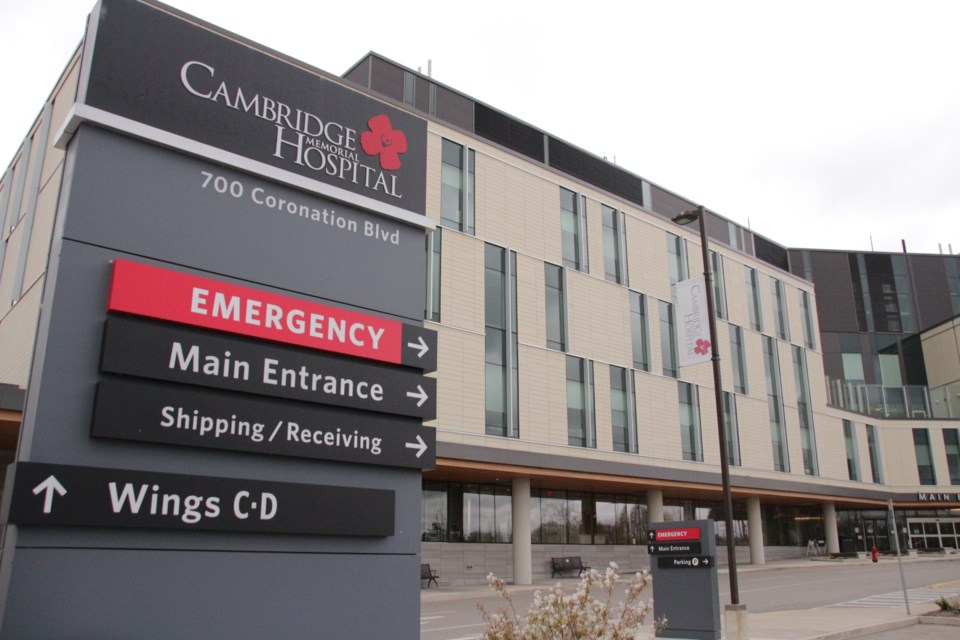Cambridge Memorial Hospital (CMH) has yet to issue any fines since the Ontario government passed Bill 7.
The legislation, which has been in effect since September, allows hospitals to move patients to long-term care homes without their informed consent and charge them $400 a day if they are discharged but choose to remain in hospital.
Passed by the Ford government, Bill 7 was introduced as a means to address bed shortages currently plaguing Ontario hospitals, and to help stabilize the health-care system’s backlog of surgeries and long wait times in emergency rooms across the province.
Under the new legislation, a long-term care home could be as far as 70 km away from a patient’s preferred choice.
Cambridge Memorial Hospital has not had to charge anyone yet, and Stephanie Pearsall, vice-president of clinical programs and chief nursing executive, says she is thankful for that.
“Luckily, we have not had to utilize any of the provisions of Bill 7. But if it comes to it, we will have to because of the legislation. Thankfully, we haven’t had to face that situation yet,” Pearsall says.
Pearsall adds the goal at CMH is to help educate patients and their families, and work with them to find the best supports and options available.
“We are really looking at providing education about Bill 7 as soon as a patient is admitted to the hospital. And, more importantly, it’s about working with patients and their families, and informing them of that short wait listed option,” Pearsall says.
As of yesterday, there were 31 alternate level of care patients at CMH waiting for placement.
“But they are not all looking for long term care. They can be waiting for a variety of places including long term care or retirement homes. Some people are waiting for palliative care and rehab. And others are waiting for services to be put in their homes so they can be placed safely,” Pearsall said.
Of the 31 patients at CMH, there are currently five patients waiting for long term care.
Pearsall said this a very dynamic process and CMH is always looking at different ways to support patients and families.
“There are another five patients that we are working with to see if there’s something we could put in place at home, so you can wait at home before you go to long term care. We work with families and patients to see if there is anything we can do while they wait,” Pearsall said.
The Ontario Nurses Association (ONC) says it is adamantly against Bill 7.
ONC says the legislation removes patients’ basic right to consent, can result in worse health outcomes for vulnerable patients, and does not address the root causes of the health-care crisis in Ontario, which is primarily understaffing of nurses and health-care professionals.
The Ontario Health Coalition (OHC) has a list of the top 10 Long-term care homes which includes the longest and shortest wait times across the province.
Cambridge Country Manor, a long-term care home with 75 beds, has a wait list of 51. According to the OHC, the average wait for a long-term care home in Waterloo Wellington is 112 days.
“If there is capacity in a home and you are moved there, it’s important to know that you are not removed from the list that includes your number one choice. So, it may be a shorter stay at another home. It might not your preferred home, but this does not mean that you lose your spot of your preferred home if you take a short wait listed home,” Pearsall says.
“I think that’s what people are afraid of, and I can certainly understand that, especially for those who might have transportation issues. When you look at the radius of 70 km, may of these patients are elderly and cannot drive as they used to, and we’re also coming into the winter months.”
Pearsall said CMH is trying to approach Bill 7, regionally.
“The same information you receive in Cambridge is the same information you will receive at Grand River or St. Mary’s in Kitchener, or at Guelph General Hospital,” Pearsall says.
“We are trying to have that regional message, so people understand that it’s the same, no matter where you go. I think if we can approach this supportively, to patients and families, I think most people will understand.”
Pearsall says in Cambridge, families are pretty understanding, and the hospital is grateful to them and their willingness to work with staff to find the best options for patients.
“Most patients and families know that they don’t need to stay in hospital. I think it’s the reassurance of knowing that you are going to a safe place, and that if it is not your preferred home, you certainly will not lose that preferred spot. It’s just waiting somewhere else as opposed to a hospital,” Pearsall said.
“What we are really trying to do is focus on understanding and education. I think that’s a much nicer way to go.”



